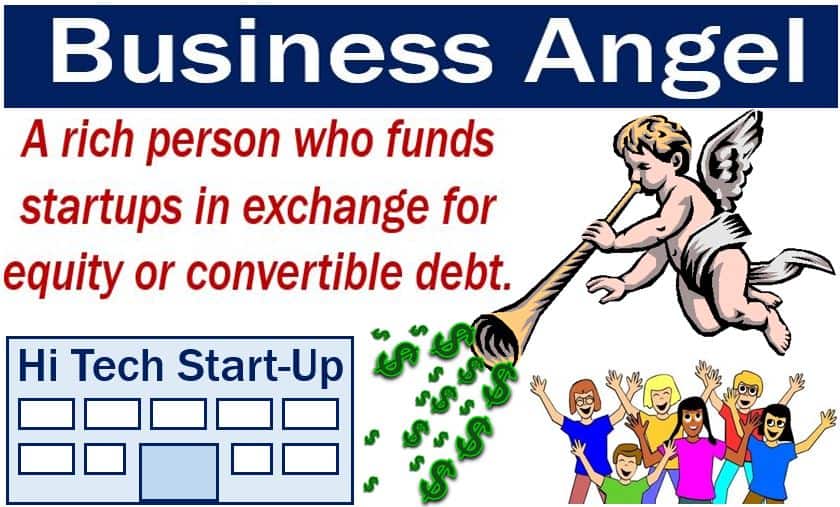Business angel – definition and meaning
A Business Angel or Angel Investor is a wealthy individual who invests personal capital in start-up companies. They invest in return for an equity stake. In other words, when they invest they obtain a percentage ownership of the start-up business. A start-up business or start-up company is one that has recently been set up, i.e., it has just started.
In this article, you will see term ‘business angel’ as well as ‘angel investor.’ They have the same meaning.
Business angels expect their investment to give them a good return. Some will take an active role in the startup business.
While some business angels are active board members, others act as advisers and keep out of day-to-day control. Many become sleeping partners. In other words, they provide the capital and but have nothing to do with the running of the company.
Business angel – good for start-ups
A business angel with the right skills may be good for a small start-up. They act as a catalyst for further investment, attracting additional capital through their endorsement and backing of a start-up.
The UK Business Angels Association says that business angels typically make 22% IRR on their investments in startups. IRR stands for Internal Rate of Return. Other studies suggest returns in the US average about 27%.
Venture capital vs. business angel: a business angel is an individual while venture capital comes from specialized firms.
Business angels use their personal money. Venture capital firms, on the other hand, use either other people’s money, the company’s money, or both.
Seed capital refers venture money that business angels invest very early in a product’s or project’s life.

Business Angels – a huge investment source
The UK Business Angels Association says private investors account for up to £1 billion early stage investment in the UK. It is the single largest source of early-stage capital in the nation.
Owners of startup businesses regularly report that company finance of up to $400,000 may be hard to obtain. Even getting this funding from venture capitalists and banks is extremely difficult.
Banks want collateral before they consider lending money, while most venture capital firms seek large deals.
Consequently, small start-up owners have to turn to business angels.
Some business angels specialize in helping firms in particular sectors. The angels focus on businesses and teams that want to expand. However, these teams must have a proven track record.
Business angels often bring a wealth of industry-specific experience and knowledge, which can be pivotal in guiding a start-up through its formative stages.
These investors can usually help with growth plans. Not only do they provide capital but also valuable know how. Additionally, business angels may provide access to their networks.
How to find a business angel
Budding entrepreneurs commonly find business angels through their own network of personal friends and family. In fact, suppliers and clients have funded many startups that are now successful companies.
You can also find people seeking angel investment opportunities through formal networking organizations.
Band of Angels is the oldest network in the United States. It has more than 120 members who provide advice and capital. Band of Angels focuses on high-tech start-up businesses. Its members have founded some well-known companies, including Symantec and Logitech.
Angels Den is the largest network in the UK, with approximately 4,500 members. It is an angel-led equity crowdfunding platform that connects startups with investors. It offers three different types of investment: donation, debt, and equity.
The European Business Angels Network (EBAN) is the pan-European representative for the early-stage investor. A group of pioneer angel networks in Europe set up EBAN in 1999. EBAN represents a sector that invests approximately €7.5 billion annually.
Two Educational Videos
These two interesting video presentations, from our sister YouTube channel – Marketing Business Network, explain what ‘Business Angel’ and ‘Venture Capitalist’ are using simple, straightforward, and easy-to-understand language and examples.
-
What is a Business Angel or Angel Investor?
-
What is a Venture Capitalist?

